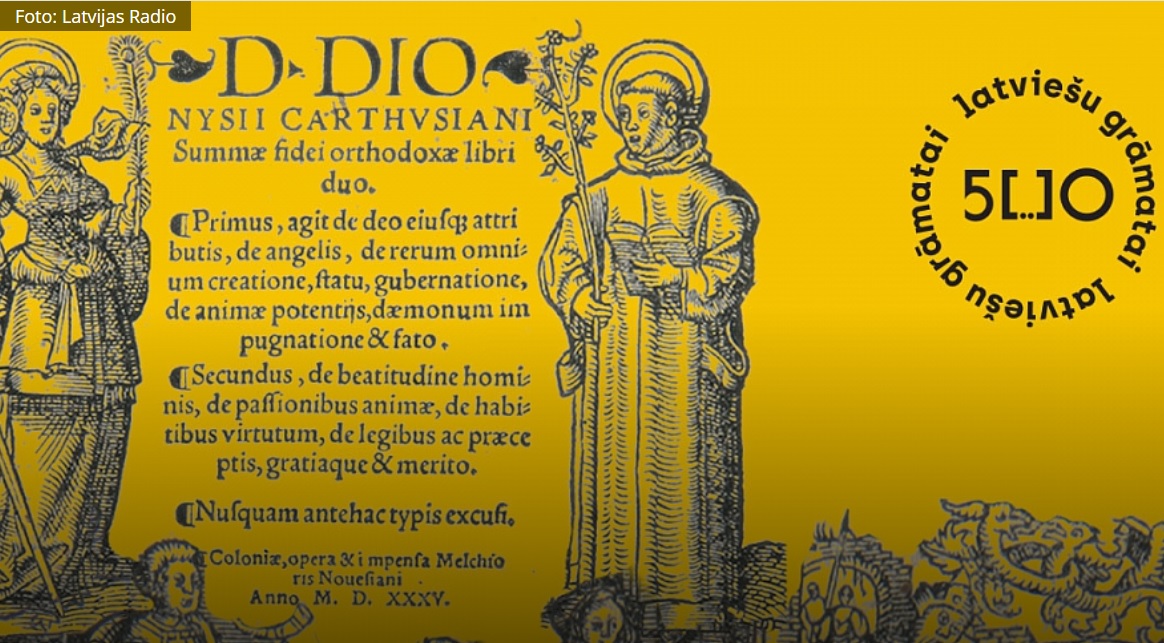More about the cycle of events can be discovered at the website https://www.gramatai500.lv and for more about the Latvian National Library and its constantly changing exhibitions and collections, visit: https://www.lnb.lv/.
The library of the Kettler family – one of the most mysterious private collections in Latvian history
Setting up the Kettler dynasty library of the Dukes of Courland and Semigallia commenced in the second half of the 16th century and continued for several generations until the end of the 17th century. In 1701, during the Great Northern War, on the orders of King Charles XII of Sweden, the library was moved from Jelgava, the capital of the Duchy, to Riga. In 1714, on the orders of Tsar Peter I of Russia, a few months after the marriage of his niece Anna Ioannovna to Duke Friedrich Wilhelm Kettler of Courland, the library was taken to St Petersburg, where it became one of the cornerstones of the library collection of the newly founded Russian Academy of Sciences.
Our current understanding of the fate of the library of the Dukes of Courland has been substantially corrected by a study titled "Collections donated by the Academy of Sciences of St Petersburg to the Alexander University of Finland in 1829: An annotated catalogue" (Helsinki, 1997), conducted by Sirkka Havu, research assistant at the National Library of Finland, in collaboration with the Russian book scholar, Irina Lebedeva.
Following Finland’s annexation to Russia as an autonomous Grand Duchy in 1809, Helsinki became its capital, and a university with a library was established in the city. In 1829 it received a large shipment of books from St. Petersburg, including 886 books from the library of the Dukes of Courland.
Among them was an incunabulum belonging to Friedrich von Brackel, Chancellor of the Duchy of Courland, and owner of the Kukši estate. This 1493 edition by the famous Nuremberg printer Anton Koberger reflected the activities of Pope Gregory IX in the 13th century. Editions from the 16th and 17th centuries feature names of many printers and publishers renowned throughout Europe, such as Christoph Plantin in Antwerp, the Giunti family in Venice, the Elzeviers in Leiden and Amsterdam, as well as books printed by the first Riga printers Nikolaus Mollinus and Gerhard Schröder, including the book of sermons in Latvian by the ducal court priest Georg Mancelius (1654).
The ducal library is dominated by books on Protestant theology (among the authors are authorities in various ecclesial movements – Martin Luther, Jean Calvin, Jakob Böhme, John Bunyan and others), and also legal literature. Bookplates and monograms, dedicatory and property inscriptions found in these books attest to their belonging to the ducal dynasty and to persons connected with the ducal court. The Helsinki collection has also yielded one book that originally belonged to the founder of the Kettler dynasty, the first Duke of Courland, Gotthard Kettler.
Books belonging to Gotthard's youngest son Wilhelm and Wilhelm's grandson Friedrich Casimir are particularly well represented in the Helsinki collection. A number of books from the Ducal Collection once belonged to the poet and librarian Christian Bornmann, the previously mentioned F. Brackel, the lawyer Onufry Gessler and several others.
Printed in 1997, the catalogue is a very useful tool for researchers working in Helsinki, which is in marked contrast to the current possibilities of obtaining accurate and correct information on the bulk of the library of the Dukes of Courland, which is still located in St Petersburg and stored in various parts of the library of the Russian Academy of Sciences.
Consequently, at present the prospects of acquiring a full picture of the size, thematic variety and proportion of different subject areas covered in the library are considerably hampered. It is difficult to draw general conclusions about the development of this collection. Only the preservation of manuscripts belonging to the family of the Dukes of Courland in the Manuscripts Department of the Library of the Russian Academy of Sciences has been, and still is, an essential prerequisite for their identification and use in research.
The 1997 publication opens up new research perspectives in the study of the spiritual interests of the members of the Kettler dynasty of the Dukes of Courland and their contemporaries. The book collection of the Kettler family and their contemporaries is one of the most interesting and simultaneously mysterious private library collections in the history of Latvian libraries.

























